
The prince-electors, pl. Kurfürsten, Czech: Kurfiřt, Latin: Princeps Elector) were the members of the electoral college that elected the ruler of the Holy Roman Empire.

The Holy Roman Emperor, originally and officially the Emperor of the Romans during the Middle Ages, and also known as the Romano-German Emperor since the early modern period, was the ruler and head of state of the Holy Roman Empire. The title was held in conjunction with the title of King of Italy from the 8th to the 16th century, and, almost without interruption, with the title of King of Germany throughout the 12th to 18th centuries.
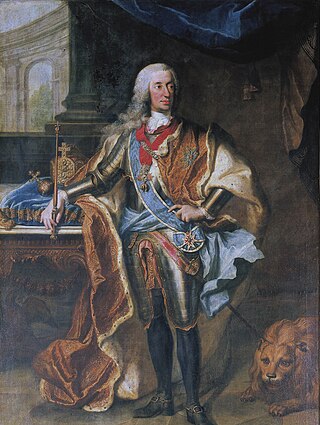
Charles VII was Prince-Elector of Bavaria from 26 February 1726 and Holy Roman Emperor from 24 January 1742 to his death. He was also King of Bohemia from 1741 to 1743. Charles was a member of the House of Wittelsbach, and his reign as Holy Roman Emperor thus marked the end of three centuries of uninterrupted Habsburg imperial rule, although he was related to the Habsburgs by both blood and marriage.
Fürst is a German word for a ruler as well as a princely title. Fürsten were, starting in the Middle Ages, members of the highest nobility who ruled over states of the Holy Roman Empire and later its former territories, below the ruling Kaiser (emperor) or König (king).
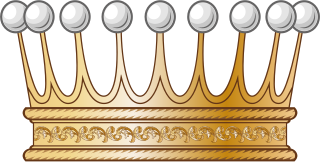
Graf is a historical title of the German nobility and later also of the Russian nobility, usually translated as "count". Considered to be intermediate among noble ranks, the title is often treated as equivalent to the British title of "earl".

King of the Romans was the title used by the king of East Francia following his election by the princes from the reign of Henry II (1002–1024) onward.
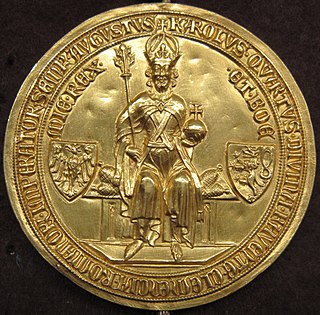
The Golden Bull of 1356 was a decree issued by the Imperial Diet at Nuremberg and Metz headed by the Emperor Charles IV which fixed, for a period of more than four hundred years, important aspects of the constitutional structure of the Holy Roman Empire. It was named the Golden Bull for the golden seal it carried.

An Imperial Estate was a part of the Holy Roman Empire with representation and the right to vote in the Imperial Diet. Rulers of these Estates were able to exercise significant rights and privileges and were "immediate", meaning the only authority above them was that of the Holy Roman Emperor. They were thus able to rule their territories with a considerable degree of autonomy.

German mediatisation was the major redistribution and reshaping of territorial holdings that took place between 1802 and 1814 in Germany by means of the subsumption and secularisation of a large number of Imperial Estates, prefiguring, precipitating, and continuing after the dissolution of the Holy Roman Empire. Most ecclesiastical principalities, free imperial cities, secular principalities, and other minor self-ruling entities of the Holy Roman Empire lost their independent status and were absorbed by the remaining states. By the end of the mediatisation process, the number of German states had been reduced from almost 300 to 39.
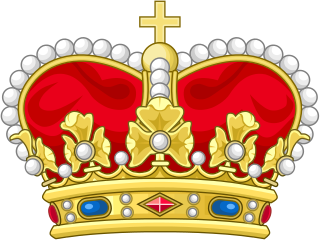
Prince of the Holy Roman Empire was a title attributed to a hereditary ruler, nobleman or prelate recognised by the Holy Roman Emperor.

The election of a Holy Roman Emperor was generally a two-stage process whereby the King of the Romans was elected by a small body of the greatest princes of the realm, the prince-electors. This was then followed shortly thereafter by his coronation as king, originally at Aachen and later at Frankfurt. The king was then expected to march to Rome, to be crowned Emperor by the pope. In 1356, the Emperor Charles IV promulgated the Golden Bull, which became the fundamental law by which all future kings and emperors were elected. After 1508, rulers usually were recognized as "Emperor elect" after their first, royal coronation.

Wenceslas I, Duke of Saxe-Wittenberg from the House of Ascania ruled from 1370 to 1388 and was a prince-elector of the Holy Roman Empire as well as Prince of Lüneburg. He was the son of Rudolf I and his 3rd wife, Agnes of Lindow-Ruppin.

The Imperial Diet was the deliberative body of the Holy Roman Empire. It was not a legislative body in the contemporary sense; its members envisioned it more like a central forum where it was more important to negotiate than to decide.

Imperial Count was a title in the Holy Roman Empire. During the medieval era, it was used exclusively to designate the holder of an imperial county, that is, a fief held directly (immediately) from the emperor, rather than from a prince who was a vassal of the emperor or of another sovereign, such as a duke or prince-elector. These imperial counts sat on one of the four "benches" of Counts, whereat each exercised a fractional vote in the Imperial Diet until 1806. Imperial counts rank above counts elevated by lesser sovereigns.
The imperial election of 1376 was an imperial election held to select the emperor of the Holy Roman Empire. It took place in Frankfurt on 10 June.
In the years 1410 and 1411 saw three royal elections in the Holy Roman Empire. The elections were prompted by the death of previous King Rupert in 1410 and, after two contested elections in 1410, resulted in Sigismund of Hungary being recognized as the new king in 1411.
The imperial election of 1438 was an imperial election held to select the emperor of the Holy Roman Empire. It took place in Frankfurt on March 18.
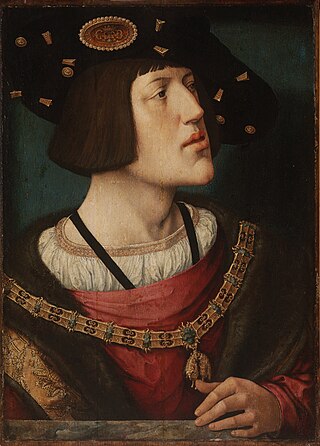
The imperial election of 1519 was an imperial election held to select the emperor of the Holy Roman Empire. It took place in Frankfurt on the 28th of June.

The imperial election of 1273 was an imperial election held to select the emperor of the Holy Roman Empire. It took place in Frankfurt on October 1.

The 1257 imperial election was a double election in which the prince-electors of the Holy Roman Empire split into factions and elected two rivals, earl Richard of Cornwall and King Alfonso X of Castile, each claiming to have been legally elected.
















